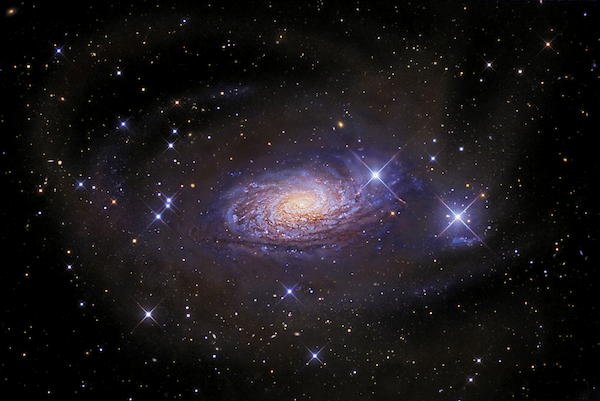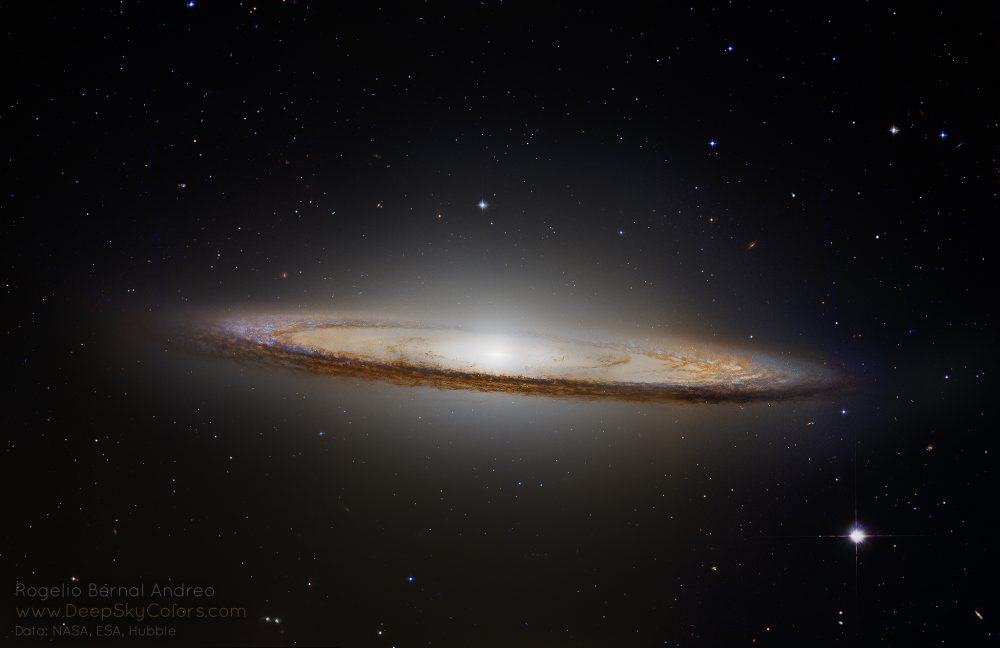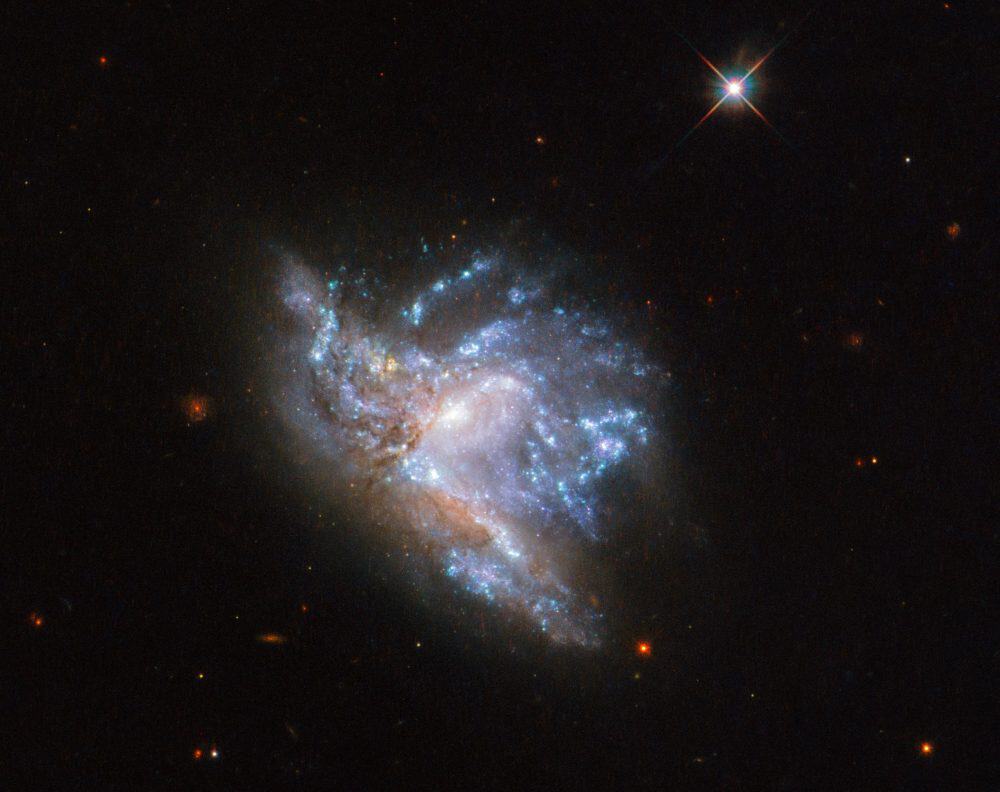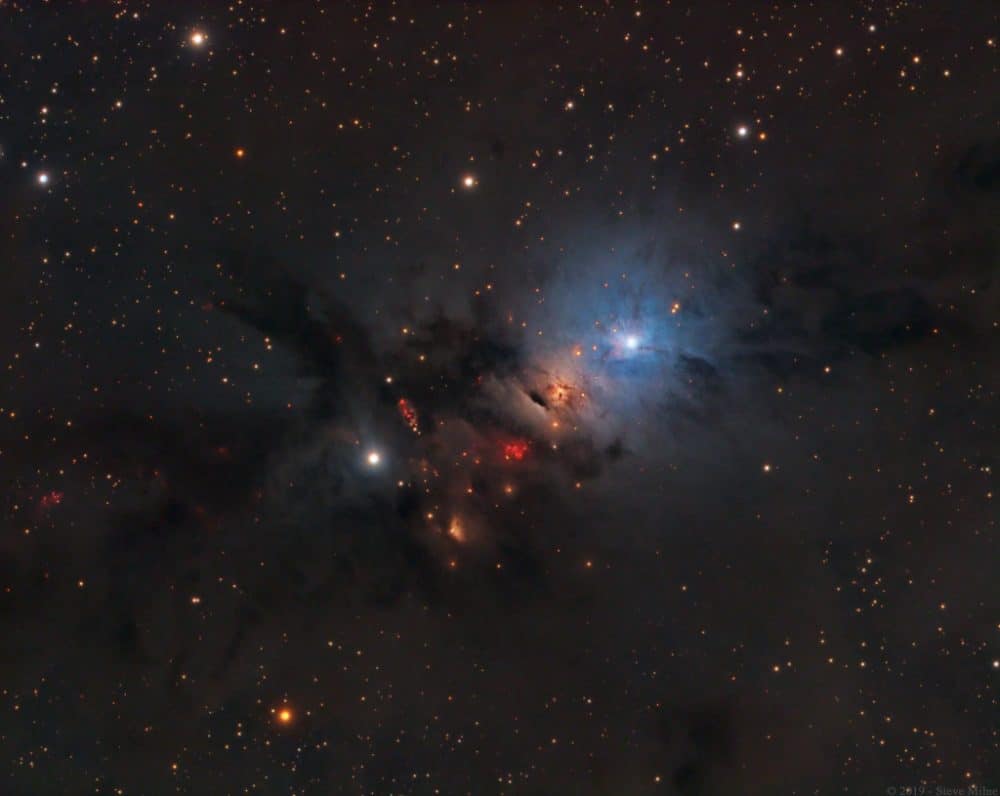Blog
At magnitude 8.2, M94 is the brightest galaxy in Canes Venatici. Through an 8-inch scope, you’ll see the tiny nucleus surrounded by a bright disk that measures only 30″ across. A much fainter oval halo surrounds the disk. Switch to a telescope of at least 16 inches aperture, and you’ll begin to see the tightly wound spiral arms close to the nucleus.
Beautiful spiral galaxy M94 (Messier 94) lies a mere 15 million light-years distant in the northern constellation of the hunting dogs, Canes Venatici. A popular target for astronomers, the brighter inner part of the face-on galaxy is about 30,000 light-years across. Traditionally, deep images have been interpreted as showing M94’s inner spiral region surrounded by a faint, broad ring of stars. But a new multi-wavelength investigation has revealed previously undetected spiral arms sweeping across the outskirts of the galaxy’s disk, an outer disk actively engaged in star formation. At optical wavelengths, M94’s outer spiral arms are followed in this remarkable discovery image, processed to enhance the outer disk structure. Background galaxies are visible through the faint outer arms, while the three spiky foreground stars are in our own Milky Way galaxy. Image: R Jay Gabany (Blackbird Obs.)
more...Norah Jones (born Geethali Norah Jones Shankar; March 30, 1979) is an American singer, songwriter, and pianist. She has won many awards and has sold more than 50 million records worldwide. Billboard named her the top jazz artist of the 2000–2009 decade. She has won nine Grammy Awards and was ranked 60th on Billboard magazine’s artists of the 2000–2009 decade chart.
In 2002, Jones launched her solo music career with the release of Come Away with Me, which was a fusion of jazz with country music and pop. It was certified Diamond, selling over 27 million copies. The record earned Jones five Grammy Awards, including the Album of the Year, Record of the Year, and Best New Artist. Her subsequent studio albums — Feels Like Home, released in 2004, Not Too Late, released in 2007, and 2009’s The Fall all gained Platinum status, selling over a million copies each.They were also generally well received by critics. Jones’ fifth studio album, Little Broken Hearts, was released on April 27, 2012, and her most recent, sixth studio album, Day Breaks, was released on October 7, 2016. Jones made her film debut in My Blueberry Nights, which was released in 2007.
Jones is the daughter of Indian sitar player and composer Ravi Shankar, and is the half-sister of fellow musician Anoushka Shankar.
more...Eric Patrick Clapton, CBE (born 30 March 1945) is an English rock and blues guitarist, singer, and songwriter. He is the only three-time inductee to the Rock and Roll Hall of Fame: once as a solo artist and separately as a member of the Yardbirds and of Cream. Clapton has been referred to as one of the most important and influential guitarists of all time. Clapton ranked second in Rolling Stone magazine’s list of the “100 Greatest Guitarists of All Time“ and fourth in Gibson‘s “Top 50 Guitarists of All Time”. He was also named number five in Timemagazine’s list of “The 10 Best Electric Guitar Players” in 2009.
In the mid-1960s Clapton left the Yardbirds to play with John Mayall & the Bluesbreakers. Immediately after leaving Mayall, Clapton formed the power trio Cream with drummer Ginger Bakerand bassist Jack Bruce, in which Clapton played sustained blues improvisations and “arty, blues-based psychedelic pop”. After Cream broke up, he formed blues rock band Blind Faith with Baker, Steve Winwood, and Ric Grech. Clapton’s solo career began in the 1970s, where his work bore the influence of the mellow style of J. J. Cale and the reggae of Bob Marley. His version of Marley’s “I Shot the Sheriff” helped reggae reach a mass market. Two of his most popular recordings were “Layla“, recorded with Derek and the Dominos; and Robert Johnson‘s “Crossroads“, recorded with Cream. Following the death of his son Conor in 1991, Clapton’s grief was expressed in the song “Tears in Heaven“, which appeared on his Unplugged album.
Clapton has been the recipient of 18 Grammy Awards, and the Brit Award for Outstanding Contribution to Music. In 2004 he was awarded a CBE at Buckingham Palace for services to music. He has received four Ivor Novello Awards from the British Academy of Songwriters, Composers and Authors, including the Lifetime Achievement Award. In his solo career, Clapton has sold more than 100 million records worldwide, making him one of the best-selling musicians of all time.[10] In 1998, Clapton, a recovering alcoholic and drug addict, founded the Crossroads Centre on Antigua, a medical facility for recovering substance abusers.
more...Lanny Morgan (born March 30, 1934, Des Moines, Iowa) is an American jazz alto saxophonist chiefly active on the West Coast jazz scene.
Morgan was raised in Los Angeles. In the 1950s he played with Charlie Barnet, Si Zentner, Terry Gibbs, and Bob Florence, then did a stint in the U.S. military, for which reason he had to turn down an offer to play in the orchestra of Stan Kenton. From 1960-65 he played in Maynard Ferguson‘s orchestra; after a few years in New York City he returned to Los Angeles in 1969, where he played frequently in the studios, was a member of Supersax, and played in the big bands of Bill Berry, Bob Florence, and Bill Holman.
Morgan also played on sessions for Nancy Sinatra.
more...From the Tombouctou Region of Mali.
more...Boys and Girls you will not believe this but next Tuesday April 2nd; I am flying to LA to be on Judge Judys show, and filming the next day with a tenant I took to court, a real nut case! Whaaa do ya think huh, huh?
Maybe I can be Judys Jester lol
You all will have to call in program and tell them to give me some work in Hollywood! Duh!!
Good Luck mick
We are all gonna have some fun tonight!
Everybody wants to see this so badly I will have to charge admission!
The striking spiral galaxy M104 is famous for its nearly edge-on profile featuring a broad ring of obscuring dust lanes. Seen in silhouette against an extensive central bulge of stars, the swath of cosmic dustlends a broad brimmed hat-like appearance to the galaxy suggesting a more popular moniker, The Sombrero Galaxy. Hubble Space Telescope data have been used to to create this sharp view of the well-known galaxy. The processing results in a natural color appearance and preserves details often lost in overwhelming glare of M104’s bright central bulge when viewed with smaller ground-based telescopes. Also known as NGC 4594, the Sombrero galaxy can be seen across the spectrum and is host to a central supermassive black hole. About 50,000 light-years across and 28 million light-years away, M104 is one of the largest galaxies at the southern edge of the Virgo Galaxy Cluster.
more...Mory Kanté (born 29 March 1950) is a Guinean vocalist and player of the kora harp. He is best known internationally for his 1987 hit song “Yé ké yé ké“, which reached number-one in Belgium, Finland, the Netherlands, and Spain. The album it came from, Akwaba Beach, was the best-selling African record of its time.Mory Kanté was born of mixed Malian and Guinean descent, into one of Guinea’s best known families of griot (hereditary) musicians. After being brought up in the Mandinka griot tradition in Guinea, he was sent to Mali at the age of seven years – where he learned to play the kora, as well as important voice traditions, some of which are necessary to become a griot. As a Muslim, he integrated aspects of Islamic music in his work.
https://www.youtube.com/watch?v=BUV9s9ZjpsQ
Michael Leonard Brecker (March 29, 1949 – January 13, 2007) was an American jazz saxophonist and composer. He was awarded 15 Grammy Awards as both performer and composer. He was awarded an Honorary Doctorate from Berklee College of Music in 2004, and was inducted into the Down Beat Jazz Hall of Fame in 2007.
Michael Brecker was born in Philadelphia and raised in Cheltenham Township, a local suburb. His father Bob (Bobby) was a lawyer who played jazz piano and his mother Sylvia was a portrait artist.[4] Michael Brecker was exposed to jazz at an early age by his father. He grew up as part of the generation of jazz musicians who saw rock music not as the enemy but as a viable musical option. Brecker began studying clarinet at age 6, then moved to alto saxophone in eighth grade, settling on the tenor saxophone as his primary instrument in his sophomore year. He graduated from Cheltenham High School in 1967 and spent that summer at the Berklee College of Music in Boston. After a year at Indiana University he moved to New York City in 1969, where he carved out a niche for himself as a dynamic and exciting jazz soloist. He first made his mark at age 20 as a member of the jazz-rock band Dreams–a band that included his older brother, trumpeter Randy Brecker, trombonist Barry Rogers, drummer Billy Cobham, keyboardist Jeff Kent and bassist Doug Lubahn. Dreams was short-lived, lasting only from 1969 through 1972, but Miles Davis was seen at some gigs prior to his recording Jack Johnson.
more...Flamenco Fridays featuring Taranta. Tarantas and Taranto are two related styles (palos) of Flamenco music, that originated in the Andalusian province of Almería. Each is characterized by a shared modality (F-sharp Phrygian) and harmonic progression (Bm – A7 – G – F-sharp), but differ significantly with respect to rhythm and meter. Tarantas is a cante libre (or toque libre, if played as a solo), meaning that it lacks both a regular rhythmic pattern (compás, in flamenco terminology) and a regular rhythmic unit (or beat). It can be sung or played, but not danced. Taranto, conversely, has a regular 2/4 meter, and is danceable. When played on, or accompanied by, the guitar, both palos have a unique and characteristic sound that is created, in part, by dissonances that result from the use of the guitar’s first three open strings (E, B, and G, respectively), in combination with harmonies and melodies based on the F-sharp Phrygian mode
more...
Located in the constellation of Hercules, about 230 million light-years away, NGC 6052 is a pair of colliding galaxies. They were first discovered in 1784 by William Herschel and were originally classified as a single irregular galaxy because of their odd shape. However, we now know that NGC 6052 actually consists of two galaxies that are in the process of colliding. This particular image of NGC 6052 was taken using the Wide Field Camera 3 on the NASA/ESA Hubble Space Telescope.
A long time ago gravity drew the two galaxies together into the chaotic state we now observe. Stars from within both of the original galaxies now follow new trajectories caused by the new gravitational effects. However, actual collisions between stars themselves are very rare as stars are very small relative to the distances between them (most of a galaxy is empty space). Eventually things will settle down and one day the two galaxies will have fully merged to form a single, stable galaxy.
Our own galaxy, the Milky Way, will undergo a similar collision in the future with our nearest galactic neighbour, the Andromeda Galaxy. Although this is not expected to happen for around 4 billion years so there is nothing to worry about just yet.
more...Stefani Joanne Angelina Germanotta (born March 28, 1986 Lenox Hill Hospital in Manhattan, New York City), known professionally as Lady Gaga, is an American singer, songwriter and actress. She is known for her unconventionality, provocative work, and visual experimentation. She began performing as a teenager, singing at open mic nights and acting in school plays. She studied at Collaborative Arts Project 21, through New York University‘s Tisch School of the Arts, before dropping out to pursue a music career. When Def Jam Recordings canceled her contract, she worked as a songwriter for Sony/ATV Music Publishing, where Akon helped her sign a joint deal with Interscope Records and his own label KonLive Distribution in 2007. She rose to prominence the following year with her debut album, the electropop record The Fame, and its chart-topping singles “Just Dance” and “Poker Face“. A follow-up EP, The Fame Monster (2009), featuring the singles “Bad Romance“, “Telephone” and “Alejandro“, was also successful.
Gaga’s second full-length album, Born This Way (2011), explored electronic rock and techno-pop. It peaked atop the US Billboard 200 and sold more than one million copies in the country in its first week. Its title track became the fastest selling song on the iTunes Store with over a million downloads in less than a week. Gaga experimented with EDM on her third studio album, Artpop (2013), which reached number one in the US and included the single “Applause“. Her collaborative jazz album with Tony Bennett, Cheek to Cheek (2014), and her soft rock-influenced fifth studio album, Joanne (2016), also topped the US charts. During this period, Gaga ventured into acting, playing leading roles in the miniseries American Horror Story: Hotel (2015–2016), for which she received a Golden Globe Award for Best Actress, and the critically acclaimed musical drama A Star Is Born (2018), for which she was nominated for the Academy Award for Best Actress. She also contributed to the latter’s soundtrack, which received a BAFTA Award for Best Film Music and made her the only woman to achieve five US number one albums in the 2010s. Its lead single, “Shallow“, topped the US charts and earned Gaga the Academy Award for Best Original Song.
Having sold 27 million albums and 146 million singles as of January 2016, Gaga is one of the best-selling music artists in history. Her achievements include several Guinness world records, nine Grammy Awards, an Academy Award, a BAFTA Award, two Golden Globe Awards, and an award from the Songwriters Hall of Fame and the Council of Fashion Designers of America. She has been declared Billboard‘s Artist of the Year and included among Forbes‘s power and earnings rankings. She was ranked number four on VH1‘s Greatest Women in Music in 2012 and second on Time‘s 2011 readers’ poll of the most influential people of the past ten years, and was named Billboard‘s Woman of the Year in 2015. She is known for her philanthropy and social activism, including her work related to LGBT rights, and for her nonprofit organization, the Born This Way Foundation, which focuses on empowering youth and preventing bullying.
more...Donald Ray Brown (born March 28, 1954) is an American jazz pianist and producer.
Brown was born in Hernando, Mississippi and raised in Memphis, Tennessee, where he learned to play trumpet and drums in his youth. From 1972 to 1975 he was a student at Memphis State University, by which time he had made piano his primary instrument. He was with Art Blakey‘s Jazz Messengers from 1981 to 1982, then took teaching positions at Berklee College of Music from 1983 to 1985 and the University of Tennessee from 1988.[2] Brown has recorded for Evidence, Muse, and Sunnyside.
more...Thaddeus Joseph Jones (March 28, 1923 – August 20, 1986) was an American jazz trumpeter, composer, and bandleader who has been called “one of the all-time greatest jazz trumpet soloists.”
After his military service, which included an association with the U.S. Military School of Music and working with area bands in Des Moines and Oklahoma City, Jones became a member of the Count Basie Orchestra in May 1954. He was featured as a soloist on such well-known tunes as “April in Paris“, “Shiny Stockings” and “Corner Pocket”. However, his main contribution to Basie’s organization was nearly two dozen arrangements and compositions, which included “The Deacon”, “H.R.H.” (Her Royal Highness — in honor of the band’s command performance in London), “Counter Block”, and lesser known tracks such as “Speaking of Sounds”. His hymn-like ballad “To You” was performed by the Basie band combined with the Duke Ellington Orchestra in their only recording together, and the recording Dance Along With Basie contains nearly an entire album of Jones’ uncredited arrangements of standard tunes.
In 1959 Jones played cornet on Thelonious Monk‘s 5 by Monk by 5 album.
more...NGC 1333 is seen in visible light as a reflection nebula, dominated by bluish hues characteristic of starlight reflected by interstellar dust. A mere 1,000 light-years distant toward the heroic constellationPerseus, it lies at the edge of a large, star-forming molecular cloud. This striking close-up spans about two full moons on the sky or just over 15 light-years at the estimated distance of NGC 1333. It shows details of the dusty region along with telltale hints of contrasty red emission from Herbig-Haro objects, jets and shocked glowing gas emanating from recently formed stars. In fact, NGC 1333 contains hundreds of stars less than a million years old, most still hidden from optical telescopes by the pervasive stardust. The chaotic environment may be similar to one in which our own Sun formed over 4.5 billion years ago.
more...More Posts
- World Music with Nadya Giga and Their 101 Candles Orchestra
- Daily Roots with Cornell Campbell
- The Cosmos with the Antares
- Charlie Watts Day
- Ahmed Jamal Day
- World Music with Mamady Keita
- Daily Roots with Leroy Smart
- The Cosmos with IC 5332
- Leon “Ndugu” Chancler Day
- James Cotton Day
- Willie Dixon Day
- World Music with Music Maya Aj
- Daily Roots with Horace Andy
- The Cosmos with Trapezium Cluster
- Stanley Clarke Day
- Andrew Hill Day
- World Music with Nico Kasanda
- Daily Roots with Hortense Ellis
- The Cosmos with M24
- Gilberto Gil Day




